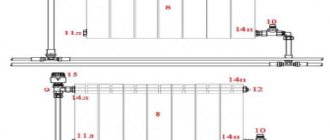The issue of replacing heating batteries in an apartment usually arises acutely in the autumn-winter period, when, after turning on the centralized heating in people's apartments, the radiator suddenly bursts, it stops heating or breaks down.
What to do, who to contact for replacement batteries and who should pay the costs incurred for replacing radiators in 2021: the owner or the management company?
The reasons for replacing batteries in an apartment can be different: the owner wants to replace an outdated model of heating device with a new one; the battery has become unusable (burst, rusted, etc.). Depending on the reasons, both the management organization and the owner can make the replacement on their own or with the help of a third-party organization.
Who should replace batteries?
The apartment owner can replace the radiator using one of three options:
- Replace the batteries yourself.
- Seek help from outside experts.
- Submit a request to the service company to call a technician.
Please note that if you replace the batteries yourself, all responsibility for further actions will fall on the shoulders of the owner . If you resort to the services of specialists from a private company, then in case of any problems you will have to ask them.
But the fact is that the customer will not always be able to contact the company again, and even if he can, it is not a fact that the specialist will come to his home again and fix the problem. Therefore, in this case, it is best to contact a specialist who is on the staff of the service company or housing office.
Even if for some reason an accident occurs in the future, the responsibility for the malfunction, for the installation of batteries, resulting in damage to the property of the owner or his neighbors, will fall on the management company.
So who should change the batteries? To ensure that the owner does not have problems in the future, it is best to contact the company that services the house (management company, housing office, homeowners association, etc.).
When is the management company obliged to replace the batteries in the apartment free of charge for the owner?
This depends on two factors: first, it is important to look at how the batteries are connected to the heating riser (whether there is a device between the battery and the common pipe that allows you to disconnect the battery from the central system).
If there are no shut-off valves, then the battery belongs to common property . In this case, the management organization or HOA (homeowners' association) is responsible for its integrity and uninterrupted operation. And it is she who is obliged to replace the batteries, but only if there is a real threat that the battery may burst.
If a replacement needs to be made, then the owner must invite a representative of the management company to the house to inspect the battery and draw up a report stating that the device is in disrepair and needs to be replaced.
Based on this act, the management company will be obliged to install a battery for the homeowner, and it must do this free of charge.
What to do if the management company refuses to change the battery for free?
If for some reason the management company refuses to replace a battery that is in disrepair free of charge, then the homeowner should document this fact and then file a lawsuit.
If the court is on the plaintiff’s side, then the defendant will be required not only to pay a fine, but also to compensate the plaintiff for the specified amount of moral damage.
Replacing radiators through the Housing Office
So, replacing heating radiators through the housing office begins, as a rule, with submitting an application. It’s no secret that communicating with such organizations requires limitless patience. Therefore, it is worth preparing an application in two copies. The responsible person of the operating organization must make a note of acceptance on your copy. It is necessary to ensure that there is an incoming number, date and legible signature of the person who accepted your application. You will need all this for further disputes with this organization. And they will definitely be there if you are determined.
You can also remind the housing office that if the battery breaks, then compensation for material damage in this case will be assigned to the service company. In general, you should prepare for a long struggle. Not everyone wants to get involved with the housing office. However, so that your communication does not boil down solely to payment for services, you need to know your rights, at least superficially.
Replacing a heating battery in a house served by a housing office
If the house is serviced by a housing maintenance office, then the battery can be replaced through the housing office only in two cases:
- If the battery life has expired.
- If the radiator fails.
In all other cases, the housing office is responsible for the maintenance of common property and ongoing repairs . Thus, the service life for a cast iron battery is 15-30 years (for use in an open type system) and 30-40 years (for a closed type system).
If the owner knows for sure that the heating device has served longer than this period, then he has every right to contact the Housing Office with a written application request to replace the batteries in the apartment. It is important to note that replacing batteries in apartment buildings falls under the category of major repairs, the timing of which the housing office must notify residents of.
Many citizens do not want to contact the housing office, since this is a very troublesome and drawn-out process . It is easier for people to spend money and replace the heating batteries themselves, but in this case they need to remember that in case of unauthorized installation, the owner himself will be responsible for the consequences of such an installation.
Work time
Any work related to the heating system must be carried out during the non-heating period. In this case, the exception is emergency situations. It is important to take into account that privatized apartments are maintained only at the expense of their owners. That is, free replacement of heating radiators in such a situation is impossible. In accordance with numerous legislative acts, the owner of the apartment must independently prepare it for the heating season. It is your responsibility to ensure that heating appliances are in good working order. And if it is necessary to repair them, contact the operating company.
Procedure for replacing the battery in an apartment
Before removing the old battery and installing a new one, you need to coordinate your actions. And to do this, you should notify the management company or the HOA about the upcoming work.
If the owner decides to change one type of battery to another, or increase the heating area, or move the battery to another place, then he must contact an expert who will tell you whether it is possible to install the battery.
Otherwise, the thermal balance of the house may be disrupted. When moving the battery, the owner needs to contact experts who should conduct an examination.
Having clarified the main points, you can now consider step by step how to replace heating batteries in an apartment:
- Step 1. Contact the management company/housing office. You should not rush to buy new batteries, because first you should submit a written application to the management company and report that the apartment is planning to replace the batteries. On site, the applicant must be given technical specifications with a detailed description and requirements regarding which radiator can be installed and where it should be installed.
- Step 2. Contact the design organization. If the management company has given the go-ahead for the installation of new radiators, and the owner wants to move the battery to another location, then he needs to contact any design organization, whose specialists will make a project calculating the radiators planned for installation.
- Step 3. Contact the management company again. With the finished project, the applicant must again contact the management organization and write an application to replace the batteries, attaching the project, as well as other necessary documents for replacement: papers confirming ownership of the apartment, a copy of the technical passport of the housing, etc. If the owner wants to install batteries with the help of a third-party company and not a management company, then in addition to the application, he must attach a copy of the certificate of registration of the organization and membership in the SRO.
- Step 4. Issuance of a document agreeing to replace the battery. An application submitted to the management company is reviewed within 30 days. The result will be the issuance of written approval for battery replacement or refusal with mandatory indication of the reasons.
- Step 5. Contact the management company with an application to disconnect the risers. This is the final stage, at which the owner must once again contact the service organization and submit an application to turn off the risers and discharge water for a specific replacement date.
Do I need to coordinate battery replacement with the Housing Office?
You can also order replacement of apartment batteries from a third-party company, the main thing is to agree with the housing office to shut off the heating riser. For more information on how to obtain such permission, see the detailed instructions from SpetsMontazh LLC.
In order to replace batteries and not spoil relations with the housing and communal services, you need to consistently take the following actions.
- Come to the housing office (or DEZ, or HOA) and state your request. Removing old radiators and installing new ones requires removing water from the entire heating riser. This cannot be done without the participation of utility workers. You should clarify the procedure and select a date for turning off the water.
- Submit an application to the Housing Office. It is compiled by the owner of the apartment or the main tenant. In the document you state your request to cover the entire riser.
- Receive a positive response from the head of the department. To do this, housing office employees need to inspect the pipes, assess the condition of the heating system, and review the documents for new heaters. Make sure that everything is in order with the technical documentation.
- Agree with the housing office and the contractor company on the date and exact time when it will be possible to drain all the water from the riser and shut it off. Replacing one radiator usually takes about an hour on average. SpetsMontazh LLC installs practical bimetallic heating radiators in a short time. The best time to carry out work is 10 am. Draining the water and turning off the riser is performed by a plumber from the Housing Office staff.
- Be personally present when replacing batteries.
- After the new radiators are installed, contact the Housing Office again. You need to submit an application in which you inform the utility service about the completion of the planned work. In addition, you will have to make a request for a housing office representative to check the correct installation of the equipment and the integrity of the system.
- Agree on a time for a specialist visit. At the appointed time, he comes to the specified address and performs diagnostics. If the rules for installing batteries have been followed, the plumber opens the water in the riser. After water has entered the system, it is again checked for cracks, leaks and weld quality.
- Receive a document signed by the chief engineer of the housing office and confirming the high-quality replacement of batteries.
SpetsMontazh LLC provides a guarantee for all services provided. Our clients do not experience any problems with inspections and subsequent operation. Free consultation on the procedure and technology for high-quality replacement of heating batteries by phone.
What is needed to replace the battery?
First you need to decide what type of radiator to choose: cast iron, steel or aluminum. Next, you need to decide on the number of sections, after which you can proceed to installing a new battery (subject to obtaining consent from the management company):
- find out if there is water in the heating system;
- replace old brackets with new ones (if the old ones do not fit the new mounts);
- install plugs and a valve from below on new radiators;
- make a sealed connection by winding the fiber. Cover the top with sealant;
- After installing the radiator, you should connect it to the heating system, and then remove the air from the battery through the tap.
After the installation of the battery is completed, the owner must invite representatives of the management company to the house to check the tightness of the connection.
Price issue
The cost of replacing heating batteries in an apartment depends on several factors:
- the cost of services of an intermediary company ready to dismantle the old battery and install a new radiator;
- Battery Type;
- features of the apartment/house.
On average, the owner will have to pay 4 thousand rubles for installing a new battery. Additionally, the owner will have to spend about 600 rubles more on the purchase of a tap, plugs, plugs, and brackets.
Answers to questions on the topic
Where to turn if a new battery bursts due to improper installation?
First you need to remember who installed the radiator . If the installation of the heating device was carried out by a specialist from a service company, then you need to contact them there.
If this was done by a master from a third-party organization, then you should file a complaint with this authority. If justice or truth cannot be achieved, then you can go to court.
Do I need to change the technical data sheet when replacing the battery in an apartment?
According to Art. 25 of the Housing Code of the Russian Federation, replacement, transfer or installation of utility networks, sanitary equipment requires amendments to the technical passport.
But when replacing batteries, this is not necessary, since according to Instructions on housing inventory registration No. 37 dated 08/04/98, the data sheet does not include data on the presence of heating appliances.
Therefore, even when moving the heating device, the technical data sheet does not need to be changed.
Who can you trust to install new batteries?
It is best to use the services of a management company, but if the owner does not want to go there, then he can find a third-party company whose employees will quickly and correctly do this work.
But when choosing a particular company, it is important to check if the organization has the appropriate licenses and certificates to carry out such work.
If there are no documents, then it is better to continue the search than to later sue the company because of which the battery burst, burst, fell, caused damage to the owner, neighbors, etc.
At whose expense is the replacement of batteries in a municipal apartment carried out?
In municipal housing, replacement of batteries is always carried out at the expense of the administration, since the owner of the housing in this case is the municipality. Therefore, residents’ expenses for replacing the radiator are subject to reimbursement by the administration.
At whose expense are heating radiators replaced in an apartment that has been privatized?
If there is a need to replace the battery as a result of wear or an accident (a pipe has leaked), then the organization servicing the house must replace it.
Moreover, it is she who must bear the financial costs associated with replacing the radiator.
However, the situation in 2021 is such that management companies are not interested in people knowing about their rights, that they can install and dismantle worn-out pipes at the expense of the service organization, and not pay money from their own pockets.
If the owner of the apartment wants to replace the battery for the reason that the old radiator does not fit into his new interior, while the heating device has not yet worn out, then he will have to carry out the replacement from his own pocket.
Who is responsible for a battery failure and flooding of neighbors?
If, as a result of a battery break, the neighbors in the apartment were flooded, then the management company will have to be responsible for the consequences and compensate for losses, but on the condition that the owner is not to blame for what happened.
If the owner independently changed the battery without approval, and it burst over time, then the responsibility will lie entirely with him.
But even if the installation was agreed upon with the management company, and the dismantling of the old battery and installation of a new one was carried out by a master from a private company, then the owner will also be responsible for the consequences of what happened.
If you know how to replace heating batteries in an apartment, then you should not rush and install new radiators . If the shelf life of the heating device has come to an end, then you have every right to submit an application to the service organization and request that they replace the batteries at the expense of this organization.
If the owner wants to change the battery because it does not suit him for some characteristics or external parameters, then in this case he must understand that all costs associated with the purchase of new batteries and their installation will fall on his shoulders.
Replacing heating batteries in an apartment - at whose expense and in what cases? 2021
As autumn approaches, people are thinking about insulating their homes. And then the problem of heating it becomes urgent.
It's good if your apartment receives enough heat through central heating devices to feel comfortable in the cold. But when it is not enough due to low thermal power or leaking radiators, it becomes necessary to replace the batteries.
It would seem that everything is simple - take the money and change it, but from the point of view of Russian legislation, not everything is so simple. And a lot of questions arise: at whose expense should the heating batteries in the apartment be replaced - through the housing office or with your own hands?
Who should change pipes in a privatized or municipal apartment? Most owners of privatized apartments do not even think about the fact that not the entire apartment is their property. For example, according to the provisions of the Housing Code of the Russian Federation, walls, roofs and transit communications (including batteries) are common property. This means that financial responsibility for their condition falls on the shoulders of the management company servicing the house.
So homeowners are not at all obliged to pay for the necessary replacement of radiators. However, there is a small subtlety here: the radiator ceases to be considered a common property if it can be separated from the riser using a locking device - a jumper. But if the jumper is missing, then the tenant can count on free replacement of the heating batteries in the apartment.
In addition, due to the ownership of common property by all owners, the latter can collectively decide to replace the batteries for an additional fee, which must be specified in the relevant clause of the management agreement.
As for citizens renting housing from the state, they are subject to the same rule, or more precisely, the same “Rules for the maintenance of common property in an apartment building,” approved by Decree of the Government of the Russian Federation of August 13, 2006 No. 491, paragraph 6.
It lists the items of common property: an intra-house heating system, including risers, heating elements and shut-off valves that regulate them, as well as other equipment on these networks.
This legal act classifies the heating system as a common property, the repair and replacement of which, according to the same law, is paid by the management company from funds accrued under the article “Routine repairs and maintenance of the house,” with the exception of work carried out as part of a major overhaul of the heating system of the house generally.
Therefore, if a heating radiator does not have a shut-off valve, then tenants do not have to pay for the purchase of a radiator and its replacement.
If there is a valve, replacing the heating batteries in the apartment will be considered routine repairs, and, according to clause 4 of the social tenancy agreement, this is carried out at the expense of the tenant. In particular, the contract states that the tenant is obliged to monitor the serviceability and safety of the equipment inside the apartment and make routine repairs to the premises “at his own expense.”
The list of repair work also includes “repair of in-house engineering equipment,” including the heat supply system.
By defining a heating radiator as common property, the law limits the ability of a tenant or apartment owner to independently replace radiators. This creates many obstacles in the path of a person who decides to replace the radiator in an apartment without the help of a management company.
According to Articles 44 and 46 of the Housing Code of the Russian Federation, the battery, being part of common property, can only be replaced by a decision of all shareholders at a general meeting. Otherwise, replacing pipes and heating radiators in the apartment will be interpreted as unauthorized disposal of common property. And this imposes personal liability on the violator of the rules in the event of an accident in the heating system.
Moreover, interference may also arise from the HOA, which often requires coordination with them for the installation of an additional heating element in the apartment or a change in its configuration. The HOA is inclined to consider this as a re-equipment, notes about which should be included in the technical passport of the premises. Whereas in reality, battery replacement is not reflected in the data sheet. In addition, it is worth knowing that replacing heating batteries in an apartment should be carried out, if possible, in the summer or before the heating is turned on.
Despite all the legal obstacles, it is often much easier to replace the battery yourself than to legally obtain the same from the management company.
In response to your request to replace the central heating batteries in the apartment, utility workers may refer to the clause “on the balance sheet distinction” between common and private property, according to which the owner himself is responsible for the repair and maintenance of the batteries.
Therefore, if the central heating batteries in your apartment require replacement (and there is no jumper on them), and the management company refuses to pay for this procedure, then write an official letter to the organization servicing the house demanding to change the batteries . And, having studied the legal side of the issue, get ready to defend your case in court. And to save heat, you can always install heat meters in your apartment.
If the apartment has old radiators, then replacing them will cost a decent amount .
At whose expense should the batteries in the owners' apartments be replaced, and who will be responsible in the event of an emergency after a leak?
We will tell you in the article how to replace the heating battery in an apartment through the housing office.
Dear readers! Our articles talk about typical ways to resolve legal issues, but each case is unique.
If you want to find out how to solve your particular problem, please contact the online consultant form on the right or call the free consultation numbers:
Is it possible not to pay rent, and what happens if debt accumulates? Find out the answer right now.
The issue of property ownership of heating devices in an apartment is complex.
In accordance with Part 1 of Art. 36 of the Housing Code of the Russian Federation, plumbing and other equipment are considered common goods in apartment buildings , but only on the condition that this equipment serves more than one room.
Part 1 of Art. says the same. 290 Civil Code of the Russian Federation.
RF PP dated August 13, 2006 No. 491 introduced the Rules for the maintenance of common property in apartment buildings into a legislative act, so in paragraph 6 of these Rules... it is specified that the in-house heating system with risers, radiators, all fittings, heat meters, etc. refers to common property.
But in paragraph 5 it is clarified that only everything that is located before the valve located on the outlet from the riser towards the apartment will be considered common.
Thus, if apartment radiators can be disconnected from the entire system, then they cannot be considered a common property . In the absence of such a valve, indoor radiators are part of the general heating system.
There is a clear answer to the question of who should pay for replacing radiators in an apartment, and this answer is: the owner must pay .
If the housing is privatized, then when replacing normally working heating devices with a more modern option, the owner must pay, as well as when batteries are not considered common property .
In a situation where apartment batteries belong to common property, their replacement must be made at the expense of funds contributed by all owners under the article “maintenance and repair of common property.”
This is interesting: Electricity tariff in rural areas 2021
Municipal housing is transferred for use under a social contract. rental, therefore the owner, that is, the municipality .
You can learn about the size of the fine for smoking in the entrances of residential buildings from our article.
The owner must replace heating appliances that are working normally .
Situations with heating equipment can be very different, and the procedure differs, depending on the circumstances. But it is important to remember that resident intervention is unacceptable: it is important that professional plumbers .
If during the heating season one or more of them leak, then this situation may be considered a pre-emergency situation (water as a coolant is under pressure in the heating system, which is fraught with flooding of apartments along the riser), which is the responsibility of the management company to eliminate by replacing the leaky device with a new one.
This statement is also confirmed by the Rules and Regulations of those. exploitation of housing stock, approved. RF PP No. 170.
A leak in a cast iron radiator is a malfunction that must be eliminated immediately after receiving a signal from the residents, using the forces and means of the management company. Having discovered a leak, the apartment owner must, without wasting a minute, notify the organization servicing the apartment building.
The management company, homeowners association, housing office or other service company is obliged to respond immediately and eliminate the problem, preventing the development of a large-scale accident.
An example of a complaint to the management company about replacing heating radiators.
If heating radiators leak after stopping the supply of heat to the MKD, the malfunction should still be eliminated, but not in such a severe mode. A battery leak indicates that water has not been drained from the system . The procedure is as follows:
- Residents report the problem to the management company.
- Management company employees fix the leak, if possible, or change the battery at the expense of funds donated by the owners.
Only a specialist servicing an apartment building can quickly shut off the riser or cut off the heating from the entire entrance.
how to replace the heating riser from housing and communal services in the video:
In the event of an emergency, all responsibility lies with the technical service of the management company, homeowners association or housing office.
In this situation, it most often turns out that scheduled inspections of the general household facilities , there was no testing of the system, as a result of which a leaky pipe and radiator were inspected.
How to calculate ODN for electricity according to the established standard? Read about it here.
If the replacement of radiators does not take place as part of a campaign for planned or major repairs of apartment buildings, but is an initiative of the residents, then both the purchase of materials and the work will be carried out at the expense of the apartment users themselves . It is important to realize that unauthorized actions with the heating system are unacceptable.
It is impossible to do without a management company or housing office, but this does not mean that local plumbers need to be hired to carry out the work.
It is more logical to find a reliable contractor specializing in san. those. works, but not only an excellent reputation and the presence of recommendations from friends are important, you need to check permits, including proof of membership in an SRO for this particular type of work and services.
After choosing a contractor, you must contact the management company. The employee and the management company can also carry out work, but it is unlikely to be quick.
applications are submitted to the Criminal Code :
- about replacement of heating devices;
- regarding turning off the riser and removing water.
If the first appeal is submitted with the aim of obtaining approval in principle for a replacement and determination of deadlines, then the second is directly for the execution of work.
applications for temporary shutdown of the riser.
How much does it cost to replace radiators? For dismantling and installing one radiator they charge from 2,500 rubles. up to 4000 thousand rubles. (excluding the cost of the batteries themselves). This amount also includes related operations, such as garbage removal.
Benefits exist for the following categories of residents:
- large families;
- disabled people;
- pensioners, etc.
In practice, obtaining benefits for plumbing services is not easy. If contractors are involved in the work, they are unlikely to be interested in the cramped circumstances of the customers.
If the work is carried out by the management company, then you can really count on benefits : the management company has all the papers about the availability of benefits, subsidies and other payment concessions.
What are the timing and frequency of checking gas equipment in residential buildings? You will find the answer on our website.
Do I need to coordinate the replacement or relocation of radiators in the apartment and with whom?
Replacing, let alone moving, radiators without approval should really not be done , especially if it is planned to replace the batteries with a completely different design or increase the number of sections.
These actions are qualified as a violation of the rules for the use of common property, which is managed by the service company (clause 5.2.5 of the Rules...).
It is necessary to apply the planned changes to the apartment plan and contact the management company with the chief engineer or technical director, operation engineer, and agree with these officials.
It is possible that you will need to contact the heating supplier: this is where specialists will be able to perform thermal engineering calculations and issue recommendations in the form of a simple project.
Thermal balance is a certain balance between the heat entering the apartment building and heat loss through walls, ceilings, windows, floors, cracks and various cold bridges. Manipulating batteries can really upset this balance , and the rooms can become cool or, conversely, hot.
When the topic of the urgent need to replace existing radiators with new ones is being intensively discussed, then someone is interested in selling radiators or in providing paid services that amount to a round sum on the scale of apartment buildings.
The management company has the right to make a decision on a total change of heating devices at a general meeting of premises owners .
Before bringing such a question to the attention of the owners, it is necessary to carry out a series of calculations with an economic justification in favor of one or another option.
Replacing batteries is an issue that cannot be resolved without the intervention of management officials. Even if apartment radiators can be disconnected from the riser and considered the property of the apartment owner, these devices are still involved in the overall heat supply system .
Read about the procedure for notifying about power outages in an apartment for non-payment here.
At whose expense is it necessary to change the batteries in the apartment? About this in the video:
Didn't find the answer to your question? Find out how to solve exactly your problem - call right now:
It's fast and free!
The beginning of the heating season can bring unpleasant surprises in the form of faulty radiators of the heating system. In this case, the temperature in the premises drops to unacceptable levels, and residents experience serious discomfort. Not all owners understand who should change the heating batteries in the apartment if they no longer serve their intended purpose. The answer to this question depends on who owns the apartment, as well as on the reason for replacing the radiators.
At first glance, the heating system of an apartment building is not much different from the method of heating other types of housing. However, it has its own nuances. It starts with inlet valves that cut off the house from the heating main. Along the flange closest to the external wall, there is a division of the areas of responsibility of the management company and the service provider. This important point helps in due course to determine who should replace the heating in an apartment building.
This is interesting: What is the IPU indication in the housing and communal services receipt for 2021
In addition to batteries, bottlings and risers, the system includes:
- hot water taps on the supply and return pipelines (one or two);
- a heating elevator that supplies hotter water through a nozzle into the socket, and through a suction, takes part of the water from the return pipeline into a repeated cycle into the heating circuit. The diameter of the nozzle regulates the temperature of the mixture and radiators;
Issues related to the operation and maintenance of common property, as well as the list of equipment and systems included in its composition, are regulated by the Housing Code of the Russian Federation and Decree of the Government of the Russian Federation dated August 13, 2006 No. 491.
Due to constant disputes about who should replace faulty radiators and other elements of the heating system in apartment buildings, the Ministry of Construction of Russia sent out letter No. 9506-АЧ/04 dated 04/01/2016, in which it clarified whether apartment heating radiators are the common or personal property of the owners and, therefore, how to change heating batteries.
According to this letter and the provisions of legislative acts, the in-house heating system includes:
- risers;
- heating elements;
- shut-off and control valves;
- ODPU heat energy;
- other equipment located on these networks.
Despite the apparent unambiguity of the position regarding heating radiators and their belonging to common property, expressed in regulatory documents, it does not always turn out to be fair.
So, only batteries serving more than one residential premises, including those without shut-off valves, which are located on branches from the risers of the intra-house heating system and are located inside the apartments, are considered common property.
Almost every resident sooner or later is faced with the need to replace old radiators. One of the main reasons is loss of tightness due to metal corrosion. Mechanical damage is also caused by pressure surges in the central heating network.
A decrease in battery power is another reason to update heating devices. Due to the poor quality of the coolant, solid deposits form on the internal surfaces of the system. This leads to a narrowing of the channels through which the coolant circulates, and therefore the power of the devices decreases.
Often, the capabilities of heating devices, the parameters of which were calculated according to old standards, are not enough to heat an apartment in a high-rise building.
If, after launching and debugging the heating system, the radiators in the apartment remain cold, and the heat supply agreement was not signed directly with the service provider, you should file a claim with the service organization (MC or HOA).
The document, drawn up in 2 copies, informs the management company that the temperature in the home does not meet established standards.
In response to a complaint, a representative of the management company must draw up a report on non-provision or poor quality of service.
If consensus is not reached, a representative of the housing inspection and an independent specialist should be invited to re-inspect. The results of the inspection are documented in a special act, 2 copies of which must be signed by all those present.
If the Criminal Code has left the claim unanswered, you should contact:
- State Housing Inspectorate of the region;
- regional branch of the Federal Service for Supervision of Consumer Rights Protection (Rospotrebnadzor);
- local body of the Federal Antimonopoly Service.
If the problem of cold batteries can only be solved by replacing them, residents want to find out who should change the heating radiators. In such a situation, there may be several options. The choice of the preferred method is related to the following aspects:
- Who owns the apartment?
- where such batteries are installed;
- what are the reasons for the proposed replacement of heaters.
From these data follows the answer to an equally important question for the owner, at whose expense the heating radiators in the apartment are replaced.
Municipal apartments are residential premises owned by the municipality and rented out to them under a social tenancy agreement.
Art. 67 of the Housing Code obliges the tenant to maintain the dwelling in proper condition, including carrying out routine repairs. The contract lists the parameters that distinguish it from capital. The systems that need to be repaired include heating.
From the text of the standard agreement it follows who repairs heating radiators in a non-privatized apartment. This responsibility clearly rests with the tenant.
However, there are exceptions to the rule. They concern the following cases:
- carrying out work to repair important elements of common property or included in the equipment of apartment buildings;
- carrying out major home repairs, including replacing the heating system.
Since large-scale renovations are required to be carried out by the owner, replacement of heating batteries in an apartment for major repairs is carried out at the expense of the owner, that is, the municipality.
In situations that allow for different interpretations, only a court can often put an end to disputes between the tenant and the landlord, if neither party wants to interpret the provisions of the standard agreement or articles of the Housing Code in favor of the opponent.
If the parties are not ready to peacefully determine at whose expense the replacement of batteries in a municipal apartment should be carried out, the most compelling argument will be a court decision.
If an apartment in an apartment building is privately owned, the owner of the property pays monthly for utilities, as well as for activities related to the maintenance of common property. If there is a need to replace radiators, he may be interested in whether the management company should change the batteries in the apartments.
Art. 167 of the Housing Code of the Russian Federation, as well as the Rules approved by the Government of the Russian Federation, determine the list of objects that belong to common property. These include equipment and communications serving all or part of the apartments in the house, including heating systems.
The Housing Code of the Russian Federation classifies all objects that are located inside the apartment and cannot be used by other residents of the house as personal.
Consequently, to the question of who should change heating radiators in a privatized apartment, we find a clear answer in the legislation: all work on their maintenance must be carried out by the owner.
If the management company intends to carry out a planned overhaul of the apartment building, then as part of these measures the heating system, including heating equipment in the owners’ apartments, can be completely replaced. In this situation, it is clear at whose expense the batteries in a privatized apartment are replaced - the work is financed from the funds of the management company.
If an accident occurs in an apartment due to a leak in the heating radiators, or a pre-emergency situation occurs with a minor leak in the radiators, the homeowner must immediately notify the service company about this. This step is a mandatory component of how to replace heating batteries in an apartment through the housing office in 2021.
According to the law, in this case, the management company, housing office or homeowners association must deal with the elimination of the emergency situation with the subsequent replacement of heating devices installed in the apartment in the apartment building.
Moreover, service organizations are obliged to carry out all necessary work free of charge. This is one of the cases when free replacement of heating batteries in an apartment through the housing office is quite possible. After receiving information from the owner about the accident, in order to prevent more serious consequences, the damage should be immediately eliminated at the expense of the forces and means of the management company.
After the management company accepts the claim to replace the radiators, we can assume that the owner of the home with an emergency radiator has resolved the issue of how to change the batteries through the housing office for free.
If residents decide to update the batteries not because of an emergency, but only out of a desire to improve their appearance or performance characteristics, they can do this themselves, but with the direct participation of the management company.
Despite the fact that these works are not within the competence of the management company, contacting specialists will help you figure out how to properly change heating batteries.
Unauthorized intervention in the heating system can disrupt its operation, and the one who took unauthorized actions will have to answer for this.
To do everything according to the rules, you need to find an organization that will replace the radiators. She must have a license or SRO certificate of approval to carry out this type of work.
After installing the batteries, a representative of the management company will conduct a technical examination and sign an act of registration of new heating devices.
Before you begin replacing radiators, you should obtain permission from the management company to carry out such work. To do this you need to provide:
- statement;
- registration certificate of the premises where the replacement will be carried out;
- title documents for the apartment;
- certificate that the contractor is included in the Unified State Register of Legal Entities.
It usually takes about 2 months to review documents. After this, permission is signed to turn off the riser and drain the coolant from the heating system. The document specifies the time and maximum duration of the work.
Often the management company offers paid work or tries to shift the replacement of emergency batteries to the owner of the premises. In such a situation, the owner can file a complaint with the Housing Inspectorate. It should indicate that responsible persons are avoiding the performance of direct duties.
Replacing batteries in an apartment is a troublesome undertaking, which, depending on the reasons, may be the responsibility of the owner, tenant or service company. The legislation of the Russian Federation helps determine in what case and who is obliged to carry out work and finance it.
Lawyer. Member of the Bar Association of St. Petersburg. More than 10 years of experience. Graduated from St. Petersburg State University. I specialize in civil, family, housing, and land law.
The question of who should change the heating batteries in an apartment becomes especially acute with the onset of cold weather. After all, if the battery leaks or there is not enough heat in the house, replacement cannot be avoided. In this article we will figure out who owns the batteries in the apartment and at whose expense they are replaced.
Government Decree No. 491 of August 13, 2006 determined the composition of property that is considered common. According to this regulatory act, the common property of an in-house heating system includes:
- risers;
- heating elements;
- control and shut-off valves;
- collective heat metering devices;
- other equipment located on these networks.
However, when the need arises to change the batteries in an apartment (especially in a privatized one), both the owner and the management company interpret the legislation in their own interests. Due to regular judicial appeals, the need arose to clarify the normative act.
Dear readers! We cover standard methods for solving legal problems, but your case may be unique. We will help you find a solution to your problem for free
— simply call our legal consultant at:
It's fast and free ! You can also quickly get an answer through the consultant form on the website.
To clarify the controversial situations, the Ministry of Regional Development of the Russian Federation sent letter No. 6037-RM/07 dated April 4, 2007, in which batteries in apartments are recognized as included in the common property of the building. Of course, it is not in the interests of the management company to convey this information to the owners of privatized apartments. Therefore, homeowners are often forced to replace the battery in their apartment at their own expense.
Since batteries in an apartment are recognized as the common property of an apartment building, financial responsibility for their replacement or repair falls on the management organization. But there is one nuance here too.
If there is a tap on the branch from the riser of the common house system, with which you can turn off the system in the apartment, then battery maintenance becomes the responsibility of the owner.
In all other cases (it doesn’t matter whether your apartment is municipal or privatized), repairs and replacement of heating equipment are carried out at the expense of the management company. Payment comes from the accounting item “Routine repairs and maintenance of the house.”
Simply put, if your battery is leaking, the management company will replace it. You need to call a specialist, and he is obliged to replace the device free of charge.
It would seem nothing complicated. But in practice, things often happen differently. The management company's employees may say that they do not have a replacement battery. They may offer to repair the old device or install plugs and ask you to wait. This wait usually drags on. Therefore, the owner cannot stand it and purchases a battery at his own expense, because no one wants to freeze in the cold season.
If you nevertheless changed the battery in the apartment at your own expense, you have the right to demand compensation from the management company through the court. However, practice shows that such disputes are rarely resolved in favor of the owner. If you find yourself in this situation, it is advisable to contact a lawyer for professional help.
What should an owner or tenant do under a social tenancy agreement if the batteries in the apartment are in working order, but are obsolete? In this case, you can replace them only at your own expense, since the management company is not obliged to do this.
This is where difficulties arise. Since the battery in your apartment is a common property, the tenant’s ability to replace it himself is limited by law.
In accordance with Art. 44 and art. 46 of the Housing Code of the Russian Federation, the battery, being part of the common property, can be replaced only with the consent of all owners at the meeting.
If you ignore this fact, replacing the battery in the apartment will be regarded as unauthorized disposal of common property, which entails certain liability for the violator. For example, if an emergency occurs, the owner who has unauthorizedly replaced the batteries will eliminate the consequences of the emergency at his own expense. What to do?
The first thing you need to do before replacing the battery in your apartment is to coordinate such actions with the management company.
- If the radiators are replaced with similar ones, it is enough to notify the management company. No additional approvals will be required.
- If the batteries are replaced with heating devices that imply a change in configuration or an increase in the heating area, then in addition to notifying the management company, an examination will be required. In some cases, installing new radiators has a negative impact on the heat balance of the house. An expert will be able to determine the possibility of installation. The examination is carried out at the expense of the apartment owner.
- If you plan to move heating equipment, you will also need an expert opinion.
Who changes the batteries in the apartment? The owner can do this himself, contact a third-party company, or call a specialist from the management company. It is recommended to contact a “local” specialist. This way, in the event of an accident that results in damage to other residents, you cannot be blamed for incorrect installation. Accordingly, financial liability for emergency consequences will not overtake you.
»
Other
The battery is cold but the riser is hot: causes of the problem and ways to fix it 2021
Read more
Other
Water in the basement of an apartment building: what to do and where to go 2021
Read more
Great article 0











